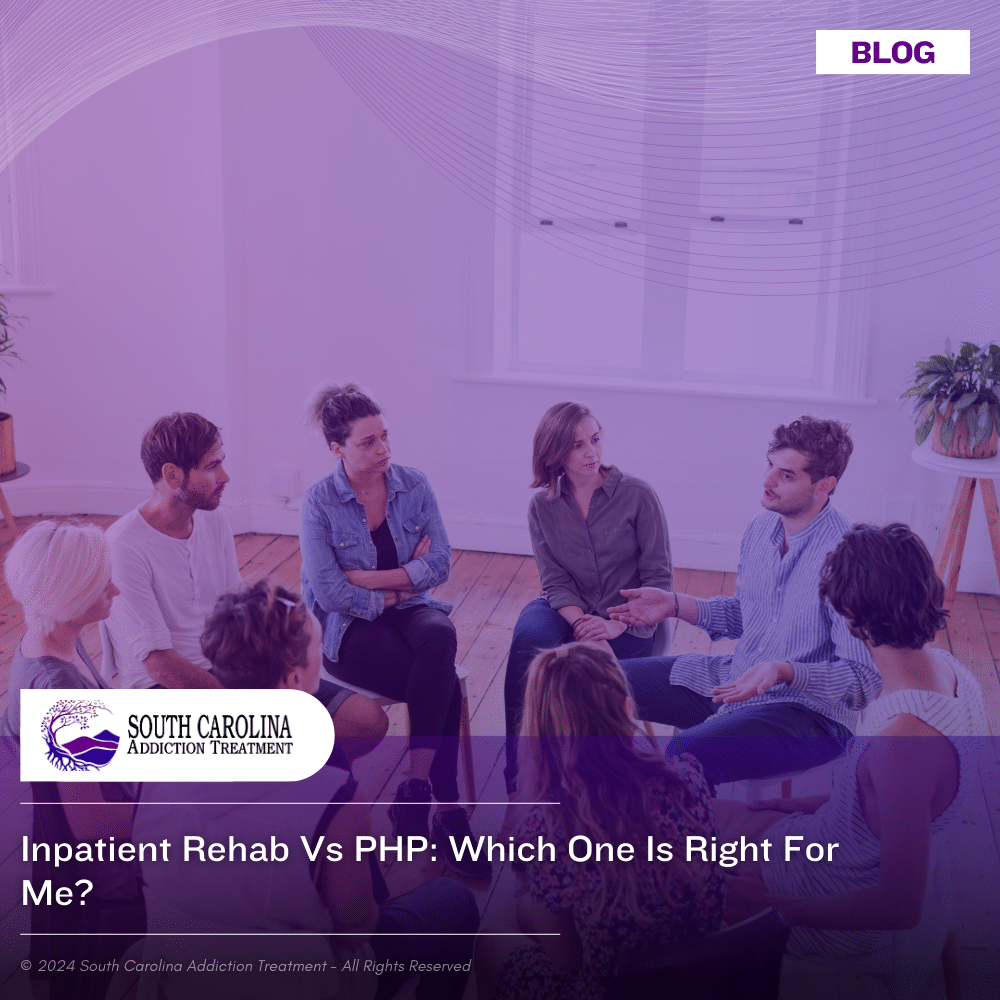Inpatient Rehab vs PHP: Which One is Right for Me?

Medically Verified: 2/1/24
Medical Reviewer
Chief Editor

All of the information on this page has been reviewed and verified by a certified addiction professional.
According to the U.S. Department of Health and Human Services (HHS), 46.3 million people suffered from a substance use disorder in 2021.[1]
Addiction and alcoholism are chronic and progressive diseases that require ongoing treatment and maintenance to achieve long-lasting recovery. This means that individuals who struggle with a substance use disorder must attend at least some form of professional treatment.
Each person who endures addiction is different, so there are many different types of substance abuse treatment programs. The two most common types of addiction rehab are inpatient treatment and partial hospitalization programs (PHP). While inpatient requires you to live at the facility, PHP allows you to live at home and commute to the center for treatment sessions.
But how do you know whether inpatient or PHP is right for you?
Inpatient addiction treatment programs are best suited for people with moderate to severe substance use disorders who have a high chance of relapsing, while PHPs are designed for people who have either already completed residential rehab or can keep themselves accountable for their own sobriety.
What is Inpatient Rehab?
Inpatient rehab is the most intensive form of addiction treatment. These programs offer 24/7 care as you reside at the facility while you receive treatment. Typically, the majority of your day during an inpatient rehab program will be full of therapy sessions, addiction education groups, relapse prevention skills training, and more.
During inpatient rehab, you can expect the following:
- Medical detox services
- 24/7 monitoring and supervision
- Access to treatment for physical health conditions
- Individualized treatment planning
- One-on-one therapy
- Group counseling
- Randomized drug testing
- Trauma-informed care
- Access to mental health treatment
- Medication-assisted treatment
- Holistic therapies like nutritional counseling
- Relapse prevention planning
- Aftercare
Depending on your needs, inpatient rehab can last anywhere from 30 to 90 days. There are also long-term inpatient rehab programs that last longer, however, this is less common.
Who Should Attend Inpatient Treatment?
Inpatient treatment can benefit almost anyone, including people who only have mild substance use disorders. However, it may not be feasible for some, as you have to take time off from work or school.
Inpatient treatment is best suited for individuals who have:
- A moderate to severe substance use disorders
- A high risk of relapsing or previous relapses in their history
- Tried outpatient rehab before with no success
- Co-occurring mental health conditions that require treatment
- The ability to take time off of work or school to attend treatment
- A need for 24/7 monitoring and care
It is important to note that inpatient treatment is often used as part of a continuum of care. This means that if you feel you need extra support, you can transition into an outpatient program like PHP after completing residential treatment.
What is a Partial Hospitalization Program (PHP)?
Partial hospitalization programs are a step down from inpatient in terms of treatment intensity. To explain, you still receive similar treatment services as inpatient rehab, however, you live at home or in a sober living housing program instead of at the facility. This means you do not have access to 24/7 care and will be expected to keep yourself accountable for your own sobriety.
Partial hospitalization programs offer the following services:
- Individualized treatment planning
- One-on-one therapy
- Group counseling
- Randomized drug testing
- Trauma-informed care
- Relapse prevention planning
- Aftercare
Partial hospitalization programs are the most intensive form of outpatient treatment available. With that being said, most PHPs require you to attend treatment for 5 days per week and last up to 90 days depending on your needs.
Who is PHP Best Suited For?
Partial hospitalization programs are not recommended for people who have severe substance use disorders, co-occurring mental health conditions, or a history of relapse. With that being said, you can attend inpatient before you transition into a PHP.
If you relate to the following, PHP might be right for you:
- You have a mild to moderate substance use disorder
- You have already completed inpatient treatment or do not require 24/7 monitoring and supervision
- You do not struggle with a co-occurring mental health condition that requires treatment
- You need flexibility in your scheduling to care for outside responsibilities
- You have a stable home environment to return to after attending treatment sessions
- You have not suffered from a relapse in the past
PHPs are best used in combination with inpatient treatment, however, some people might experience success with a PHP as a standalone program if they are highly motivated in their recovery.
Get Help for Addiction Today
If you or a loved one struggles with drug addiction or alcoholism, it’s time to seek professional help. Long-term substance abuse can impact every aspect of your life, making it imperative that you receive support from an addiction treatment center.
To learn more about our treatment programs for addiction, contact the South Carolina Addiction Treatment Center today.
References:
- The U.S. Department of Health and Human Services (HHS): SAMHSA Announces National Survey on Drug Use and Health (NSDUH) Results Detailing Mental Illness and Substance Use Levels in 2021, Retrieved November 2023 From https://www.hhs.gov/about/news/2023/01/04/samhsa-announces-national-survey-drug-use-health-results-detailing-mental-illness-substance-use-levels-2021.html

